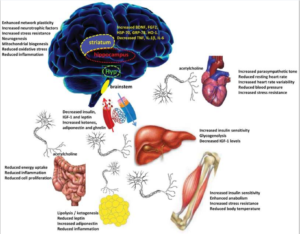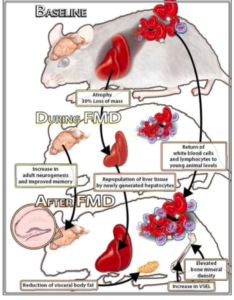


Chronic disease is related to inflammation, and Intermittent fasting (IF) is an at home strategy for you to improve your health, enhance memory, reduce ageing, reduce risk of cancer, diabetes, obesity and heart disease. Intermittent fasting (IF) is not a new form of dieting and has been performed for many years, in religious practices and other forms. Scientific studies date back to 19461, which demonstrated significant reduction in tumor growth and life span increase in rats that fasted. ‘IF’ provides many health benefits and no known disadvantages, which I will explain. It is possible to do the diet in many different ways (also provided). Intermittent fasting directly influences the gut microbiota, which is the complex, diverse, and vast microbial community that resides in the intestinal tract2 and fasting regimens appear to have positive impacts on the gut microbiota and even one night of fasting reduces biologic markers associated with chronic disease3.
Intermittent Fasting allows the cells responsible for metabolism in the stomach and intestine to rest and reduces total caloric intake:

Reduces Brain aging
Intermittent Fasting allows the intestine and stomach to rest, as there is less oxidative activity occurring in the body4, which can prevent damage to DNA. Reduces the ‘stress signalling pathways’ and enhance mitochondrial health (cell responsible for energy production and enhances stem cell regeneration 5. Brain–gut pathway activated in the brain during fasting acts to promote energy balance by enhancing gut epithelial integrity14. Diet and behaviour can be associated with brain cell regeneration. IF produces expression of growth factors, proteins that aid in cell development- allows for increased resistance to oxidative stress and aid in the formation of new brain cells15

Anti-inflammatory
Animal studies show a reduction of inflammation – they found reduced inflammatory markers (nuclear factors, cytokines; interleukin-1B, tumor necrosis factor, etc)6. Reduced C-reactive proteins (an inflammatory chemical- you may have seen this on a blood test) in human studies7. Reduction in gut related inflammatory pathologies and normalization of cells in fruit flies8. One ‘time restricted feeding’ (Ex. 4pm-10am) study found a significant reduction in chronic inflammation9

Weight loss
‘IF’ reduces the overall calories you take in, and any diet that restricts calories allows the energy intake to be less than energy expenditure will result in weight reduction. IF is just as effective (according to human study) as a continuous diet of energy restriction7

Reduces Diabetes
‘IF’ allows chemical mediators (eg. insulin) that help store sugars (glucose) to be more receptive when you do ingest sugars (increased insulin sensitivity) 4, 6, 7. A ‘time restricted feeding’ (TRF) study discovered TRF to prevent glucose intolerance9. Another TRF study found the same improved insulin resistance results in menopausal mice, as well TRF mice were more active than the control group10

Reduces Heart Disease
One study demonstrates that IF reduces myocardial damage induced by ischemia- which means that this dietary pattern can help the cells that were damaged in a heart attack. (Rats)6. This study showed that rats had a significantly smaller heart attack (coronary artery litigation- forced heart attack) after being on an IF diet6

Fasting in general has the potential to delay aging, prevent and treat disease while minimizing side effects11. Although this is not conventional medicine (yet), as more studies and research need to be completed prior to the FDA and other regulatory bodies to ensure it efficacy, but the initial results are all showing health benefits and prevention of age-related disease including: cancer, diabetes and cardiovascular disease11, 12.(Picture citation: Longo, V. D., & Mattson, M. P. (2014). Fasting: molecular mechanisms and clinical applications. Cell metabolism, 19(2), 181-192)


Fasting Mimicking Diet (2:5)
Longo, V. D., & Panda, S. (2016). Fasting, circadian rhythms, and time-restricted feeding in healthy lifespan. Cell metabolism, 23(6), 1048-1059.
Much of what causes chronic disease is related to inflammation, and intermittent fasting is an at home strategy for you to improve your health, enhance memory, potentially reduce aging, the risk of cancer, diabetes, obesity and heart disease. It is important to note that most of this evidence is reported from animal clinical trials and human studies are still lacking. However, there is always positive consequences when you are considering your health and diet, it means that you are invested in your wellness!
If you have questions about Intermittent fasting (IF), would like more information about it or other nutritional advice, please contact VitaltyHealthSolutions.
Thank you for reading,

www.vitalityhealthsolutions.org
https://www.instagram.com/vitality_healthsolutions/
Copyright ©2019 VitalityHealthSolutions, All rights reserved.
REMINDER: It is shown in metanalysis (the most credible type of research) shows that communal accountability, social support and dietary support has the ability to increase adherence to a diet or wellness program
(Lemstra, M., Bird, Y., Nwankwo, C., Rogers, M., & Moraros, J. (2016). Weight loss intervention adherence and factors promoting adherence: a meta-analysis. Patient preference and adherence, 10, 1547).
1 Carlson, A. J., & Hoelzel, F. (1946). Apparent prolongation of the life span of rats by intermittent fasting: one figure. The Journal of nutrition, 31(3), 363-375.
2 Patterson, R. E., Laughlin, G. A., LaCroix, A. Z., Hartman, S. J., Natarajan, L., Senger, C. M., … & Gallo, L. C. (2015). Intermittent fasting and human metabolic health. Journal of the Academy of Nutrition and Dietetics, 115(8), 1203-1212.
3 Patterson, R. E., & Sears, D. D. (2017). Metabolic effects of intermittent fasting. Annual review of nutrition, 37.
4 Perreault, L (MD). Obesity in Adults: Dietary Therapy. Post TW, ed. UpToDate. Waltham, MA: UpToDate Inc. https://www.uptodate.com (Accessed, 2019)
5 Mattson, M. P., Longo, V. D., & Harvie, M. (2017). Impact of intermittent fasting on health and disease processes. Ageing research reviews, 39, 46-58.
6 Ahmet, I., Wan, R., Mattson, M. P., Lakatta, E. G., & Talan, M. (2005). Cardioprotection by intermittent fasting in rats. Circulation, 112(20), 3115-21.
7 Harvie, M. N., Pegington, M., Mattson, M. P., Frystyk, J., Dillon, B., Evans, G., … & Son, T. G. (2011). The effects of intermittent or continuous energy restriction on weight loss and metabolic disease risk markers: a randomized trial in young overweight women. International journal of obesity, 35(5), 714.
8 Catterson, J. H., Khericha, M., Dyson, M. C., Vincent, A. J., Callard, R., Haveron, S. M., … & Partridge, L. (2018). Short-term, intermittent fasting induces long-lasting gut health and TOR-independent lifespan extension. Current Biology, 28(11), 1714-1724.
9 Chaix, A., Zarrinpar, A., Miu, P., & Panda, S. (2014). Time-restricted feeding is a preventative and therapeutic intervention against diverse nutritional challenges. Cell metabolism, 20(6), 991-1005.
10 Chung, H., Chou, W., Sears, D. D., Patterson, R. E., Webster, N. J., & Ellies, L. G. (2016). Time-restricted feeding improves insulin resistance and hepatic steatosis in a mouse model of postmenopausal obesity. Metabolism, 65(12), 1743-1754.
11 Longo, V. D., & Mattson, M. P. (2014). Fasting: molecular mechanisms and clinical applications. Cell metabolism, 19(2), 181-192.
12 Wei, M., Brandhorst, S., Shelehchi, M., Mirzaei, H., Cheng, C. W., Budniak, J., … & Cohen, P. (2017). Fasting-mimicking diet and markers/risk factors for aging, diabetes, cancer, and cardiovascular disease. Science translational medicine, 9(377), eaai8700.
13 Patterson, R. E., & Sears, D. D. (2017). Metabolic effects of intermittent fasting. Annual review of nutrition, 37.
14 Shen, R., Wang, B., Giribaldi, M. G., Ayres, J., Thomas, J. B., & Montminy, M. (2016). Neuronal energy-sensing pathway promotes energy balance by modulating disease tolerance. Proceedings of the National Academy of Sciences, 113(23), E3307-E3314.
15 Duan, W., Lee, J., Guo, Z., & Mattson, M. P. (2001). Dietary restriction stimulates BDNF production in the brain and thereby protects neurons against excitotoxic injury. Journal of Molecular Neuroscience, 16(1), 1-12.